
AREA
Scope & Guideline
Fostering Dialogue in Geography and Environmental Policy
Introduction
Aims and Scopes
- Qualitative Research Methodologies:
The journal emphasizes qualitative methodologies, particularly ethnographic approaches, to explore the complexities of human experiences and social relations in various geographical contexts. - Interdisciplinary Engagement:
'AREA' promotes interdisciplinary research, merging insights from sociology, anthropology, environmental studies, and public health to address pressing geographical issues. - Social Justice and Equity:
A core focus is on social justice, examining how geographical factors influence inequality, power dynamics, and the lived experiences of marginalized communities. - Environmental and Health Geography:
The journal consistently addresses themes in environmental and health geography, exploring the interplay between human health, environmental changes, and socio-political contexts. - Critical Geopolitics and Global Issues:
'AREA' explores critical geopolitics, examining how global issues such as migration, conflict, and climate change shape geographical discourses and practices. - Reflexivity and Ethics in Research:
The journal emphasizes the importance of reflexivity and ethical considerations in research practices, particularly in fieldwork contexts involving vulnerable populations.
Trending and Emerging
- Care and Relational Research:
Recent publications highlight the importance of care and relational methodologies in research, emphasizing ethical considerations and the need for empathy in engaging with research subjects. - Impact of COVID-19 on Geographies:
There has been a significant increase in research addressing the impacts of the COVID-19 pandemic across various geographical contexts, exploring themes such as health, community resilience, and socio-economic changes. - Decolonial and Indigenous Perspectives:
Emerging themes reflect a growing emphasis on decolonial approaches and Indigenous knowledge systems, challenging dominant narratives and advocating for more inclusive geographical practices. - Environmental Justice and Climate Change:
The journal is increasingly focused on environmental justice and the socio-political dimensions of climate change, addressing how marginalized communities are disproportionately affected by environmental crises. - Digital and Remote Research Methods:
There is a rising trend in the utilization of digital and remote research methods, particularly in response to restrictions imposed by the pandemic, allowing for innovative data collection and engagement strategies. - Intersectionality in Geography:
Recent publications demonstrate an increasing interest in intersectional analyses, exploring how various identities (gender, race, class) intersect to shape experiences within geographical contexts.
Declining or Waning
- Traditional Quantitative Methods:
There is a noticeable decline in the use of traditional quantitative research methods, as the journal increasingly prioritizes qualitative and participatory approaches that capture the nuances of human experiences. - Historical Geography:
Themes related to historical geography appear to be less frequently addressed, suggesting a shift towards contemporary issues and immediate societal challenges over historical analyses. - Static Geographical Models:
The reliance on static geographical models and fixed spatial analyses is diminishing, as the journal favors dynamic, fluid approaches that account for the complexities of social and environmental interactions. - Regional Studies Focus:
The emphasis on narrowly defined regional studies is waning, with a growing preference for transnational and global perspectives that reflect interconnectedness in a globalized world. - Descriptive Case Studies:
There is a decrease in purely descriptive case studies, as the journal moves towards more analytical and critical approaches that engage with broader theoretical frameworks.
Similar Journals
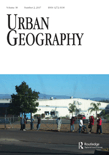
URBAN GEOGRAPHY
Advancing Insights in Urban StudiesURBAN GEOGRAPHY, published by Routledge Journals, Taylor & Francis Ltd, is a leading interdisciplinary journal that has been at the forefront of urban studies since its inception in 1980. With an impact factor that positions it in the prestigious Q1 category in both Geography, Planning and Development and Urban Studies, this journal is recognized for its rigorous research that informs policy and practice in urban environments. With a Scopus ranking of #20 out of 279 in the field of Urban Studies and #79 out of 821 in Geography, Planning and Development, it offers valuable insights for scholars, professionals, and students alike—enhancing our understanding of the complex dynamics that shape urban spaces. URBAN GEOGRAPHY is pivotal for those looking to advance their expertise in urban analytical frameworks, urbanization trends, and sustainable development strategies. Submissions are welcomed from a diverse range of perspectives, making it a vital resource for anyone invested in the future of urban landscapes.
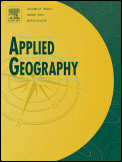
APPLIED GEOGRAPHY
Fostering collaborations for a thriving geospatial community.APPLIED GEOGRAPHY, published by Elsevier Science Ltd, stands as a premier journal within the fields of environmental science, geography, planning and development, as well as tourism, leisure, and hospitality management. With an impressive 2023 impact factor that reflects its high citation rates, this journal is ranked Q1 in several categories, underscoring its significance and influence in interdisciplinary research. Covering a broad range of topics from innovative environmental practices to spatial analysis and socio-economic factors affecting tourism, APPLIED GEOGRAPHY promotes insightful discussions and practical applications that are vital for advancing knowledge and practice in these fields. Researchers, professionals, and students will find the journal's rigorous peer-reviewed articles invaluable for staying informed about the latest trends and findings impacting the geospatial landscape. As an essential resource, APPLIED GEOGRAPHY aims to foster interdisciplinary collaborations and inspire scholarly dialogue, making it a cornerstone for those engaged in the study and application of geography across various sectors.
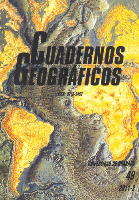
Cuadernos Geograficos
Pioneering research in geography and earth sciences.Cuadernos Geograficos is a distinguished open access journal published by UNIV GRANADA in Spain, dedicated to advancing the fields of geography, planning, and earth-surface processes. With an ISSN of 0210-5462 and E-ISSN 2340-0129, this journal has been serving as an essential platform for scholars since its inception in 1983. By providing rigorous peer-reviewed research, Cuadernos Geograficos contributes significantly to the academic discourse within these disciplines, holding a respectable position in the Q3 category for both Earth-Surface Processes and Geography, Planning, and Development as of 2023. The journal is indexed in Scopus, ranking #431/821 in Social Sciences and #100/179 in Earth and Planetary Sciences, affirming its relevance and impact within the scholarly community. With its commitment to open access since 1999, Cuadernos Geograficos ensures that vital research is accessible to a diverse audience of researchers, professionals, and students, fostering knowledge sharing and collaborative advancements in the geographical sciences.
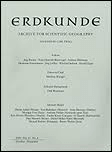
Erdkunde
Advancing Interdisciplinary Insights in GeographyErdkunde is a pivotal academic journal published by the Geographisches Institut, University of Bonn, dedicated to the fields of Geography, Earth and Planetary Sciences, and Ecology. With a history dating back to 1976, this journal serves as a platform for interdisciplinary research and discourse, reflecting diverse perspectives from both theoretical and applied dimensions within these domains. Published in Germany, it currently holds a respectable position within the academic community, classified in Q2 for Geography, Planning and Development and Q3 in Ecology and Earth and Planetary Sciences. Although not an open-access journal, its contribution is significant, offering insights that advance our understanding of spatial dynamics and environmental processes. With Scopus rankings that place it within the median range, Erdkunde is an essential resource for researchers, professionals, and students looking to deepen their knowledge and engage with contemporary trends in geographic research.

Revista Geoaraguaia
Empowering Scholars Through Open Access DiscourseRevista Geoaraguaia, published by UNIV FEDERAL MATO GROSSO, is an esteemed open-access journal dedicated to advancing research in the field of human and social sciences. Based in Brazil, this journal facilitates scholarly communication and fosters interdisciplinary approaches, exploring topics that encompass geography, sociology, and environmental studies. Although specific metrics like H-Index and impact factor are not listed, the journal is committed to providing a platform for innovative research that addresses pressing societal challenges. Researchers, academics, and students will find a rich repository of articles that not only contribute to theoretical frameworks but also enhance practical applications in various settings. By connecting local and global issues, Revista Geoaraguaia plays a crucial role in promoting academic discourse and advancing knowledge in the vibrant landscape of Latin American studies.

Atelie Geografico
Empowering Research for a Better Understanding of Our World.Atelie Geografico, published by the Instituto de Estudos Socio-Ambientais at UNIV FED GOIAS, serves as a crucial platform for the dissemination of research within the realm of Geography and related disciplines. With an ISSN of 1982-1956 and an e-ISSN of 1982-1956, this Open Access journal has been championing the free exchange of knowledge since 2007, making it accessible to a global audience of researchers, practitioners, and students. The journal's scope spans vital areas including Urban Studies, Management and Policy, Nature Conservation, and Tourism, highlighting its interdisciplinary approach to understanding socio-environmental dynamics. Despite its ranking in the Q4 category across several fields in 2023, the journal emphasizes the importance of emerging voices and innovative research, particularly as it converges towards exploring contemporary issues from 2019 to 2024. Located in Brazil, Atelie Geografico not only enriches the academic landscape but also responds to regional and global challenges, encouraging a diverse readership engaged in the critical study of environmental and social interactions.
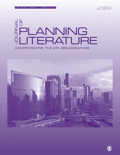
JOURNAL OF PLANNING LITERATURE
Illuminating Pathways in Planning LiteratureJOURNAL OF PLANNING LITERATURE, published by SAGE PUBLICATIONS INC, stands as a premier journal in the field of planning, geography, and development since its inception in 1985. With an impressive impact factor and a top-tier ranking in the Q1 category as per Scopus, it is a vital resource for researchers, professionals, and students committed to advancing the discipline. The journal's scope encompasses a wide array of topics related to planning literature, offering critical insights and fostering academic discourse that serves both theoretical and practical interests. Notably, it ranks #37 out of 821 in its category, positioning it in the 95th percentile for excellence. Although it does not currently offer Open Access options, the journal's rigorous peer-reviewed content and authoritative articles make it indispensable for anyone interested in the latest developments and trends in planning studies. With its commitment to high-quality research, JOURNAL OF PLANNING LITERATURE is dedicated to shaping the future of urban and regional planning research.
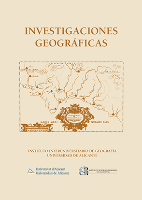
Investigaciones Geograficas-Spain
Championing empirical studies for impactful geographical solutions.Investigaciones Geográficas-Spain is an esteemed academic journal published by the Universidad de Alicante, dedicated to advancing the fields of geography, planning, and development as well as earth and planetary sciences. With its commitment to open access since 1983, the journal ensures that research is readily available to a global audience, facilitating knowledge dissemination and collaborative discourse. As reflected in its 2023 Scopus rankings, it holds a commendable position within the Q3 category in both Earth and Planetary Sciences and Geography, Planning and Development, making it a noteworthy resource for scholars and practitioners in these disciplines. The journal's scope encompasses diverse geographical research, aiming to address pressing environmental and societal challenges through empirical studies and theoretical advancements. By contributing to the knowledge reservoir from Spain and beyond, Investigaciones Geográficas-Spain serves as a vital platform for researchers, professionals, and students seeking to enrich their understanding of geographical phenomena.

TIJDSCHRIFT VOOR ECONOMISCHE EN SOCIALE GEOGRAFIE
Innovating Perspectives on Economic and Spatial InteractionsTIJDSCHRIFT VOOR ECONOMISCHE EN SOCIALE GEOGRAFIE, an esteemed journal published by WILEY, provides a premier platform for the dissemination of cutting-edge research within the fields of economics and social geography. With an ISSN of 0040-747X and an E-ISSN of 1467-9663, this journal has established itself as a pivotal resource, exhibiting a remarkable Q1 ranking in both Economics and Econometrics as well as Geography, Planning and Development for 2023. Notably, it is positioned in the 95th percentile among 821 journals in its category of Social Sciences, and ranks 46th among 716 in Economics and Econometrics, underscoring its influential role in shaping academic discourse. The journal, which has been in publication since 1967 and is anticipated to run through 2024, invites contributions that explore the intricate interplay between economic phenomena and social geospatial dynamics. Researchers, professionals, and students are encouraged to engage with its findings, which are crucial for understanding contemporary socio-economic challenges and innovations on a global scale.

Fennia-International Journal of Geography
Connecting scholars through transformative geographical research.Fennia-International Journal of Geography is a prominent peer-reviewed journal published by the Geographical Society of Finland, dedicated to advancing the field of geography through innovative research and critical discourse. With an ISSN of 0015-0010 and an E-ISSN of 1798-5617, this journal has established itself as a vital resource for academics and professionals alike since its inception in 1976. Notably transitioning to an Open Access model in 2010, Fennia provides wide accessibility to its content, fostering a global exchange of ideas and findings in various sub-disciplines of geography. The journal is currently categorized in the Q2 quartiles for Ecology, Forestry, and Geography, Planning and Development, indicating its influential standing among scholarly publications. Its Scopus rankings reflect its relevance and significance, including a 63rd percentile rank in Agricultural and Biological Sciences, and a 59th percentile in Social Sciences. Fennia serves as a crucial platform for the dissemination of research findings, policy analysis, and theoretical explorations, thereby greatly contributing to the understanding and development of geographical sciences globally.